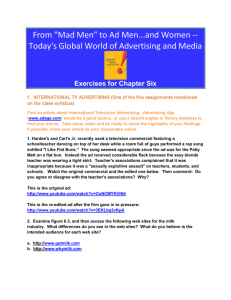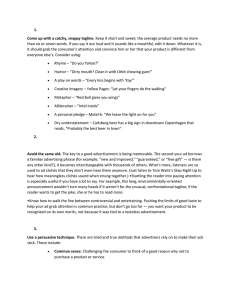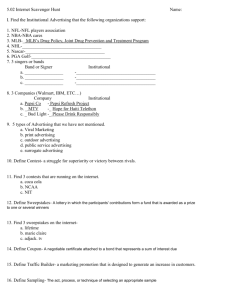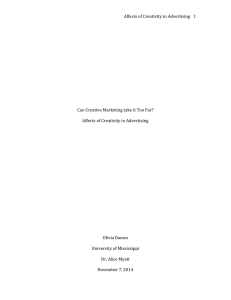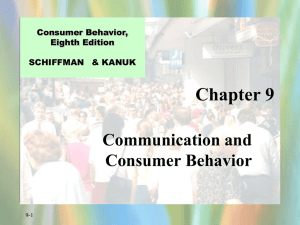The Creative Side and Message Strategy
advertisement
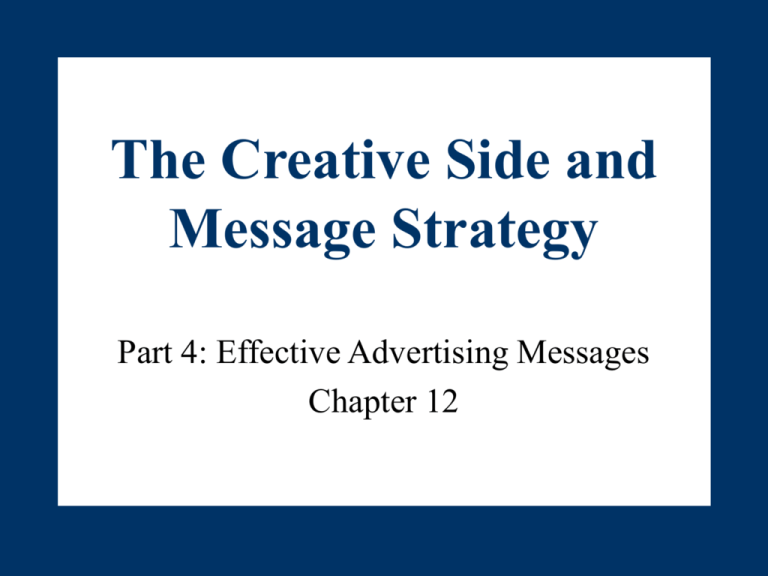
The Creative Side and Message Strategy Part 4: Effective Advertising Messages Chapter 12 The Art and Science of Creative Advertising • The ROI of effective advertising – Relevant, original, and has impact • The Big Idea – Implements the advertising strategy so that the message is both attention getting and memorable • The Creative Leap – Jumping from the strategy statement to an original idea that conveys the strategy in an interesting way 12 – 2 Creative Thinking • Free association – Creates the juxtaposition of two seemingly unrelated thoughts • Divergent thinking – Uses exploration to search for all possible alternatives • Analogies and metaphors – Used to see new patterns or relationships • Right-brain thinking – Intuitive, nonverbal, and emotion-based thinking 12 – 3 Creativity Test • IQ tests usually measure your verbal and mathematical skills. What we want to do here is measure your associative flexibility. There may be other possible answers than the ones given, but at least you can use this as a gauge to see how fluid your thinking skills are. • This test will give you some idea of your mental plasticity and, therefore, creativity. • INSTRUCTIONS: Each question below contains the initials of the words that will make it a correct phrase. Find the missing words. • FOR EXAMPLE: 7: D in a W. • ANSWER: 7: Days in a Week. 12 – 4 Creative Thinking • Creative Roles – Copywriters and art directors develop the creative concept and draft the execution of the advertising idea • The Creative Person Creative Characteristics • Problem solving • Ability to visualize • Openness to new experiences • Conceptual thinking – In advertising, creativity is both a job description and a goal 12 – 5 Steps and Stages • • • • • • Immersion Ideation Brainfog Incubation Illumination Evaluation 12 – 6 Creative Strategy • Where the art and science of advertising come together • A Big Idea must be – Creative – Strategic • Creative strategy – What the advertisement says – Also called message strategy • Creative execution – How it is said 12 – 7 Communication Objectives 1. Perception: create attention, awareness, interest, recognition, and recall 2. Cognitive: deliver information and understanding 3. Affective: touch emotions and create feelings 4. Persuasion: change attitudes, create conviction and preference 5. Transformation: establish brand identity and associations 6. Behavior: stimulate some form of action 12 – 8 Message Approaches • • • • Straightforward Demonstration Comparison Problem solving/Problem avoidance • • • • • Humor Slice of Life Spokesperson Teasers Shockvertising 12 – 9 Humor • What types of products would be most suited to the use of humor in advertising? • Why was this particular campaign successful? 12 – 10 Homework • Select two magazines that have very different target audiences • Select one ad from each magazine • Identify the message approach for each • Were the approaches different? Why or why not? 12 – 11
